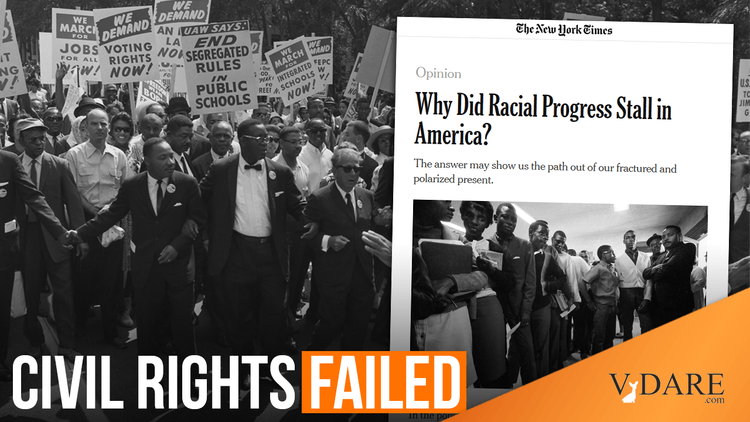
Why Did Blacks Make More Progress Before Civil Rights Than After?
12/05/2020
From The New York Times opinion page:
Why Did Racial Progress Stall in America?
The answer may show us the path out of our fractured and polarized present.By Shaylyn Romney Garrett and Robert D. Putnam
Robert D. Putnam is a political scientist. Shaylyn Romney Garrett is a writer.Dec. 4, 2020
… In our book, “The Upswing: How America Came Together a Century Ago and How We Can Do It Again,” we examine century-long data, tracking outcomes by race in health, education, income, wealth and voting. What we found surprised us.
In terms of material well-being, Black Americans were moving toward parity with white Americans well before the victories of the civil rights era. What’s more, after the passage of civil rights legislation, those trends toward racial parity slowed, stopped and even reversed. …
In measure after measure, positive change for Black Americans was actually faster in the decades before the civil rights revolution than in the decades after. For example,
These data reveal a too-slow but unmistakable climb toward racial parity throughout most of the century that begins to flatline around 1970 — a picture quite unlike the hockey stick of historical shorthand.
The life expectancy gap between Black and white Americans narrowed most rapidly between about 1905 and 1947, after which the rate of improvement was much more modest. And by 1995 the life expectancy ratio was the same as it had been in 1961. There has been some progress in the ensuing two decades, but this is due in part to an increase in premature deaths among working-class whites.
The Black/white ratio of high school completion improved dramatically between the 1940s and the early 1970s, after which it slowed, never reaching parity. College completion followed the same trajectory until 1970, then sharply reversed.
Racial integration in K-12 education at the national level began much earlier than is often believed. It accelerated sharply in the wake of the 1954 Supreme Court decision, Brown v. Board of Education. But this trend leveled off in the early 1970s, followed by a modest trend toward resegregation.
Income by race converged at the greatest rate between 1940 and 1970. However, as of 2018, Black/white income disparities were almost exactly the same as they were in 1968, 50 years earlier. Even taking into account the emergence of the Black middle class, Black Americans on the whole have experienced flat or downward mobility in recent decades.
The racial gap in homeownership steadily narrowed between 1900 and 1970, then stagnated, then reversed. The racial wealth gap is now growing as Black homeownership plummets.
Long-run data on national trends in voting by race is patchy, but the South saw a dramatic increase in Black voter registration between 1940 and 1970, followed by decline and stagnation. What data we have on national Black voter turnout indicate that nearly all of the gains toward equality with white voter turnout occurred between 1952 and 1964, before the Voting Rights Act passed, then almost entirely halted for the rest of the century.
We draw attention to the unexpected shape and timing of these trends not as an attempt to argue that things are or were better for Black Americans than they might appear. Quite the contrary. Gains on the part of Black Americans — though clear and surprisingly steady during the first two-thirds of the 20th century — were due almost entirely to their fleeing the South by the millions during the Great Migration. Starting new lives in cities such as Chicago, Los Angeles and Philadelphia meant access to better health care, education and economic opportunities. But these destinations, too, were characterized by a persistent reality of exclusion, segregation and racial violence. …
In the last half-century, however, that collective progress has halted, and many who fought so hard for this progress have now lived to see it reversed. …
It is against this backdrop of stillborn hopes and intergenerational reversals that Black Lives Matter protesters have taken to the streets. The recent police killings have undoubtedly been sparks in the dry tinder boxes of over-policed Black communities.
Judging by the huge increase in black-on-black shootings during the Racial Reckonings, Black communities are no longer oppressed by being over-policed.
But those communities are also situated within a parched landscape of stagnant progress toward racial parity, half a century after the passage of landmark Civil Rights legislation, and a century and a half after Reconstruction….
But if Black Americans’ advance toward parity with whites in many dimensions had been underway for decades before the Civil Rights revolution, why then, when the dam of legal exclusion finally broke, didn’t those trends accelerate toward full equality? Why was the last third of the 20th century characterized by a marked deceleration of progress, and in some cases even a reversal?
We have two answers to these questions.
The first is simple and familiar: White backlash.
Who can forget the Watts Riots of 1965 when Los Angeles whites took to the streets of South-Central L.A. and burned down black-owned businesses? Or the election of white candidate Tom Bradley as mayor of L.A. in 1973, beginning five terms of whites-only rule? Or the election of Coleman Young on the White Power ticket as mayor of Detroit in 1974?
Seriously, two more reasonable explanations are:
- That once Jim Crow was gone, blacks fairly quickly reached their level of accomplishment, no longer held down by an elaborate caste system in the South, and have been at about that level ever since.
- That the liberalism of the 1960s-1970s (e.g., generous welfare for single mothers and soft-on-crime policies) was bad for black culture, just as the black murder rate has gone up during the Black Lives Matter era.
